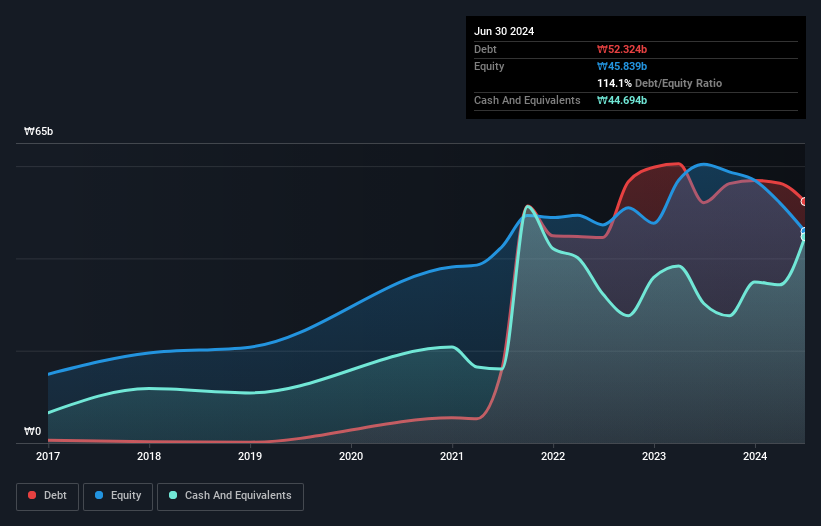- South Korea
- /
- Entertainment
- /
- KOSDAQ:A322780
COPUS KOREA (KOSDAQ:322780) Has Debt But No Earnings; Should You Worry?
Warren Buffett famously said, 'Volatility is far from synonymous with risk.' When we think about how risky a company is, we always like to look at its use of debt, since debt overload can lead to ruin. As with many other companies COPUS KOREA Co., Ltd. (KOSDAQ:322780) makes use of debt. But is this debt a concern to shareholders?
Why Does Debt Bring Risk?
Debt and other liabilities become risky for a business when it cannot easily fulfill those obligations, either with free cash flow or by raising capital at an attractive price. If things get really bad, the lenders can take control of the business. However, a more frequent (but still costly) occurrence is where a company must issue shares at bargain-basement prices, permanently diluting shareholders, just to shore up its balance sheet. Of course, debt can be an important tool in businesses, particularly capital heavy businesses. When we examine debt levels, we first consider both cash and debt levels, together.
View our latest analysis for COPUS KOREA
What Is COPUS KOREA's Net Debt?
The chart below, which you can click on for greater detail, shows that COPUS KOREA had ₩52.3b in debt in June 2024; about the same as the year before. However, it does have ₩44.7b in cash offsetting this, leading to net debt of about ₩7.63b.

A Look At COPUS KOREA's Liabilities
The latest balance sheet data shows that COPUS KOREA had liabilities of ₩81.2b due within a year, and liabilities of ₩1.68b falling due after that. On the other hand, it had cash of ₩44.7b and ₩4.34b worth of receivables due within a year. So its liabilities outweigh the sum of its cash and (near-term) receivables by ₩33.9b.
Given this deficit is actually higher than the company's market capitalization of ₩25.8b, we think shareholders really should watch COPUS KOREA's debt levels, like a parent watching their child ride a bike for the first time. Hypothetically, extremely heavy dilution would be required if the company were forced to pay down its liabilities by raising capital at the current share price. The balance sheet is clearly the area to focus on when you are analysing debt. But it is COPUS KOREA's earnings that will influence how the balance sheet holds up in the future. So when considering debt, it's definitely worth looking at the earnings trend. Click here for an interactive snapshot.
Over 12 months, COPUS KOREA made a loss at the EBIT level, and saw its revenue drop to ₩37b, which is a fall of 19%. That's not what we would hope to see.
Caveat Emptor
Not only did COPUS KOREA's revenue slip over the last twelve months, but it also produced negative earnings before interest and tax (EBIT). Its EBIT loss was a whopping ₩22b. When we look at that alongside the significant liabilities, we're not particularly confident about the company. We'd want to see some strong near-term improvements before getting too interested in the stock. For example, we would not want to see a repeat of last year's loss of ₩14b. In the meantime, we consider the stock to be risky. There's no doubt that we learn most about debt from the balance sheet. However, not all investment risk resides within the balance sheet - far from it. Case in point: We've spotted 3 warning signs for COPUS KOREA you should be aware of, and 1 of them is concerning.
If, after all that, you're more interested in a fast growing company with a rock-solid balance sheet, then check out our list of net cash growth stocks without delay.
New: AI Stock Screener & Alerts
Our new AI Stock Screener scans the market every day to uncover opportunities.
• Dividend Powerhouses (3%+ Yield)
• Undervalued Small Caps with Insider Buying
• High growth Tech and AI Companies
Or build your own from over 50 metrics.
Have feedback on this article? Concerned about the content? Get in touch with us directly. Alternatively, email editorial-team (at) simplywallst.com.
This article by Simply Wall St is general in nature. We provide commentary based on historical data and analyst forecasts only using an unbiased methodology and our articles are not intended to be financial advice. It does not constitute a recommendation to buy or sell any stock, and does not take account of your objectives, or your financial situation. We aim to bring you long-term focused analysis driven by fundamental data. Note that our analysis may not factor in the latest price-sensitive company announcements or qualitative material. Simply Wall St has no position in any stocks mentioned.
About KOSDAQ:A322780
Mediocre balance sheet with low risk.
Market Insights
Community Narratives




